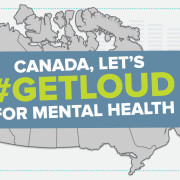May 4 – 10th IS MENTAL HEALTH WEEK IN CANADA
The Canadian Mental Health Association’s 2015 Campaign is “Are you Fine or Phine? CMHA is asking Canadians to GET LOUD about Mental Health as being phine is not fine.
Mental Health is more than the absence of mental illness, it is a state of well-being and it begins where we live, work and play. Mental Health involves how we feel, think, act, and interact with the world around us. It is about realizing our potential to cope with the normal stresses of life and make a contribution to our community.
Good Mental Health is about living well and feeling capable despite challenges. We each have a different path with our own goals, challenges, talents and abilities to adapt and cope. Each of us has a different support syttem that may or not may be of help.
The Canadian Mental Health Association lists these everyday tips to help maintain and improve mental health.
1. build healthy self-esteem – recognize your unique talents and abilities without having to compare to others. We build confidence by developing weak areas while being aware of the things we are proud of.
2. build positive support networks – good relationships…all relationships take effort and courage to reach out and build trust. Healthy relationships can provide emotional support, practical help and a point of view we may not have considered.
3. get involved – with things or activites that matter to you can can provide a feeling of purpose and satisfaction. Being involved connects us with others and our community and helps us to build new skills.
4. build resiliency – the ability to cope with problems, stress, difficult situations like accidents, unexpected life changes and conflicts. Resiliency is what helps you look at the situation realistically, take action when you can make changes, let go of things you can’t change, and recognize the helpful supports in your life. Your resiliency toolkit might include skills like problem solving, assertiveness, balancing obligations and expectations, and developing support networks.
5. recognize your emotions – feeling sad, angry, and anxious at times is part of being human. Emotional well-being involves expressing our emotions in a way that respects everyone. Emotional well-being also includes recognizing what influences our emotions, discovering how our emotions affect the way we think or act, taking action when our emotional response isn’t helpful, and learning to accept our emotions—even the difficult ones.
6. take care of your spiritual well-being – spiritual well-being means getting to know ourselves, discovering our values, and learning to be at peace with who we are. It also involves finding and connecting to something bigger than ourselves and living with purpose. It’s really about how we feel on the inside.
7. asking for help – while family and friends are important supports, there are other resources out there to help you as well. Many communities have information centres that can provide lists of available services. Or a public library might help. Examples include websites, books, films, videos and audio tapes, courses and workshops offered through community centres, schools and universities and people you admire for their ability to find balance. Maintaining your mental health sometimes means seeking the help of a professional. Speak with your doctor, seek the help of a financial planner or debt advisor, speak to a career counsellor and make a career plan, to repair relationships with loved ones and friends, talk to an expert and work through the issues.
8. lifestyle – lifestyle is not from the CMHA website but CBH. There is a huge amount of research on how lifestyle can affect our mental health. We already have a strong idea of how exercise and activity promote the release of happy hormones. We can also get a great sense of accomplishment from completing a tough workout or physical challenge. There is a number of different programs, games, puzzles, etc that we can use to stimulate the mind and challenge and change our brains. There is also a great amount of new research into what we eat and ow it affects our mental health. Changing the food we eat can have a profound effect on a number of chronic diseases and conditions and mental health issues are no different. If you want some suggestions for things to read please let me know and I can forward some suggestions.
The CMHA has some great resources to help monitor your mental health situation. Check out the following by clicking on them…
Mental Health Meter
Work Life Balance Quiz
Stress index
The CMHA Website has so much more incredible information. Check it out.




